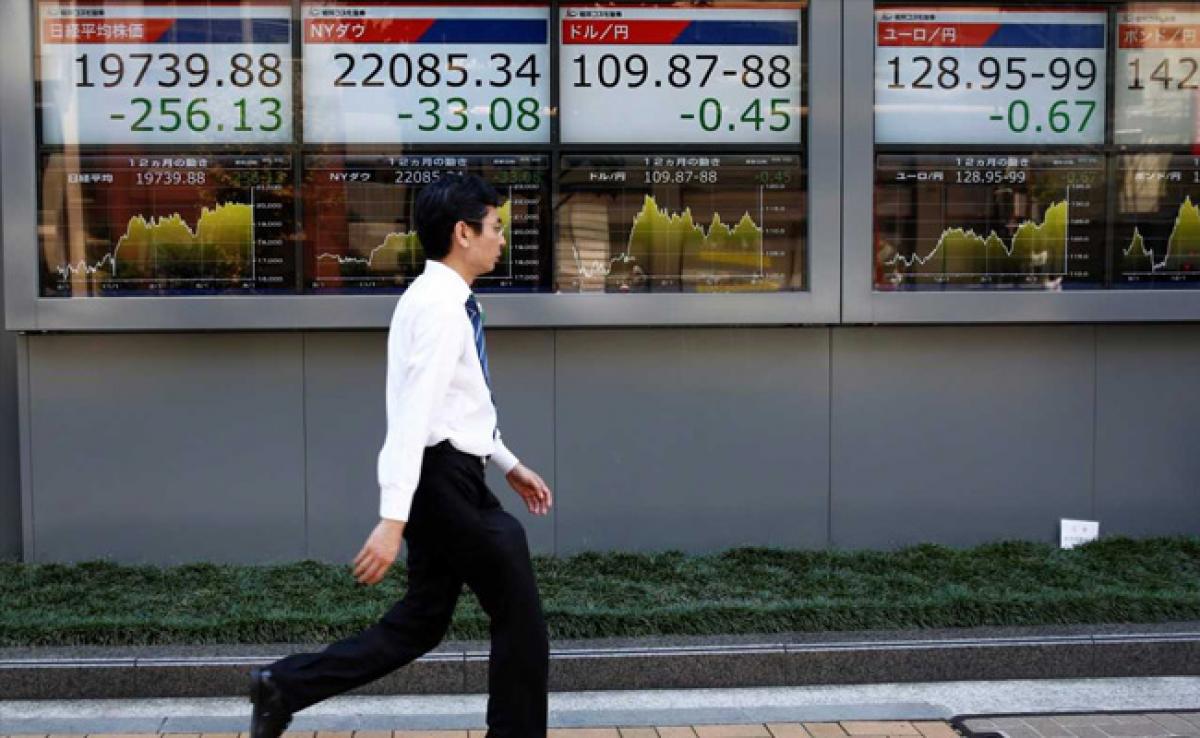Live
- Jake Paul vs Mike Tyson Draws 65 Million Viewers on Netflix Amid Streaming Glitches
- International Men’s Day 2024: Looking for the perfect gift for the special men in your life?
- Are strict laws needed to ensure MLAs attend Assembly sessions?
- Apple’s Lightning-to-3.5mm Headphone Adapter May Be Discontinued
- Kishan Reddy Slams Telangana Government, Criticizes Congress and BRS
- Lawyers demand urgent implementation of Protection Act
- Cotton farmers protest fraud in weighing process
- Faculty allegedly rags 1st yr student at Govt Med College
- Mini libraries at tribal welfare hostels soon
- Range-bound trading on positive bias
Just In

The dollar rebounded from a 2-1/2-year low on Wednesday, and Asian stocks took their cue from Wall Street\'s higher close, as concerns about North Korea\'s firing of a missile over Japan ebbed.
The dollar rebounded from a 2-1/2-year low on Wednesday, and Asian stocks took their cue from Wall Street's higher close, as concerns about North Korea's firing of a missile over Japan ebbed.
The dollar index, which tracks the greenback against a basket of six major peers, edged up 0.1 percent to 92.317.
The dollar rose 0.1 percent to 109.8 yen. On Tuesday, after slumping to a 4-1/2-month low versus the safe haven currency, the greenback closed up 0.5 percent.
The yen tends to benefit during times of geo-political or financial stress as Japan is the world's biggest creditor nation and there is an assumption that Japanese investors will repatriate funds in a crisis.
The dollar was also little changed against the safe haven Swiss franc, buying 0.9552 francs on Wednesday, after hitting its lowest since August 2015 in the previous session.
"Calmer heads have prevailed once again in financial markets, with traders seemingly happy to cover short positions and add a touch of risk into their portfolio," said Chris Weston, chief market strategist at IG in Melbourne.
The South Korean won strenagthened 0.4 percent, with the dollar buying 1,121.9 won, recovering some of Tuesday's 0.6 percent slide.
The United Nations, in a statement drafted by the United States, condemned the test but held back on any threat of new sanctions on the isolated state.
Markets seemed to be dismissing North Korea's statement on Wednesday that the test was a first step in military action in the Pacific to "contain" the U.S. territory of Guam.
Reports of the launch by North Korean media were lacking the usual boasts of technical advances, indicating the test may not have accomplished its intended goals.
Currency traders are now looking to U.S. non-farm payrolls data for August, due on Friday, following data that showed U.S. consumer confidence surged to a five-month high in August as the labour market improved and house prices rose.
"The market tone markedly improved as traders adopted a 'this too shall pass' attitude," said Stephen Innes, head of Asia Pacific trading at OANDA in Singapore.
"A boisterous U.S. consumer confidence number, coupled with a much tamer response than anticipated from President Trump may explain part of the reversal."
U.S. 10-year Treasury yields were at 2.1484 percent on Wednesday, after touching a 9-1/2-month low of 2.086 percent on Tuesday.
MSCI's broadest index of Asia-Pacific shares outside Japan advanced 0.35 percent.
South Korea's KOSPI share index rose 0.1 percent, while Australian shares were little changed.
Japan's Nikkei rose 0.55 percent.
Japanese retail sales growth slowed in July but still grew for a ninth consecutive month, suggesting the underlying trend for consumption remains healthy.
However, household spending unexpectedly fell in July, injecting some caution into the debate about whether domestic demand can continue to drive growth.
Chinese blue chips added 0.2 percent, and Hong Kong's Hang Seng climbed 0.7 percent.
In commodities, gasoline hit a near-two-year high after Hurricane Harvey shut down nearly a fifth of U.S refining capacity, and more closures are expected.
U.S. gasoline futures rose 3.1 percent to $1.8378, bringing gains this week to 10.3 percent.
The rise in crude inventories as a result of refinery shutdowns, however, weighed on oil prices.
U.S. crude futures fell 0.2 percent to $46.34 a barrel, after touching a five-week low on Tuesday.
Global benchmark Brent slipped 0.2 percent to $51.88.
Spot gold inched up 0.2 percent to $1,313.10 an ounce on Wednesday. On Tuesday, the precious metal jumped to its highest since Trump was elected U.S. president, before closing flat.

© 2024 Hyderabad Media House Limited/The Hans India. All rights reserved. Powered by hocalwire.com







